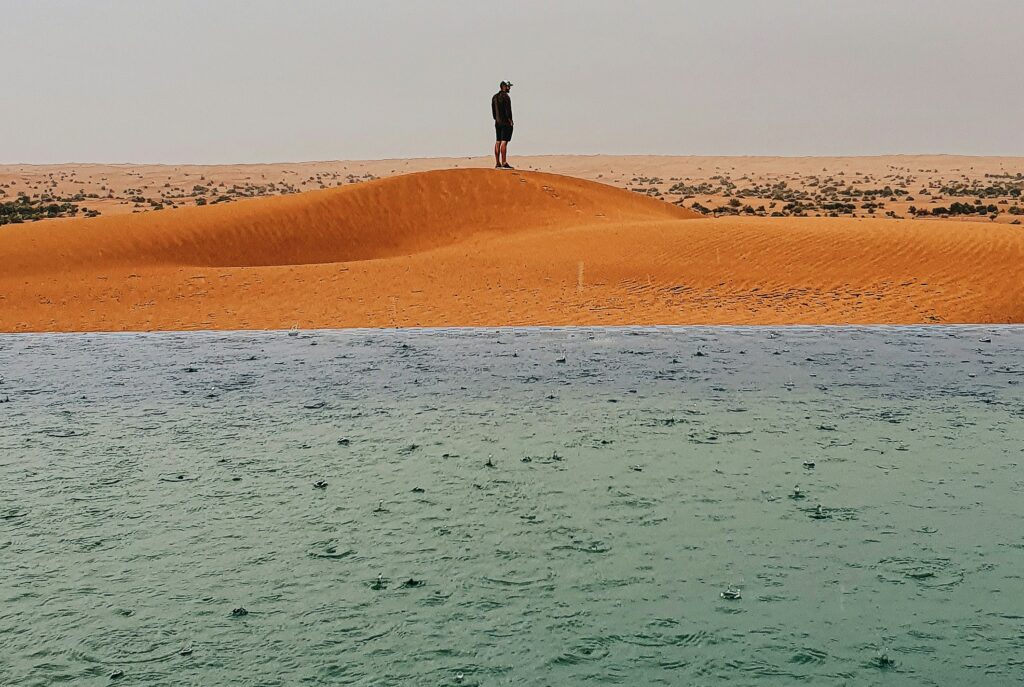Stonecoast Review
The Literary Journal of the Stonecoast MFA
Cloud Seeding

By Sandra Carlson Khalil
In Dubai, we are not allowed to gather in protest. We are not allowed to display a foreign flag, so two weeks after the fighting begins, my children and I cover our front door instead with slices of construction paper watermelon. My son cuts triangles, my daughter the rinds. Black seeds spark from the blades of my scissors and scatter across the table, more than we need.
Every day, my children return from school to ask if the fighting has stopped. Already, they are so much more aware than I ever was. Their open mouths expand with hope, then contract against the news: not yet.
* * *
Rain falls across the desert. I put my phone down and look outside. Clouds don’t often gather here and when they do, they don’t often rain on their own. They need to be pushed, cajoled. When one appears, a plane is sent to shoot salt flares into its updraft. Droplets never meant to become rain are plumped and prodded. Pinpricks metastasize into drops and begin to fall with the weight of water balloons.
This city that rose from the desert in skyscrapers and feats of engineering, rose without gutters. Water pools, then flows through the streets. Traffic signs flash warnings, and I see a man navigate an intersection on a kayak. School is canceled and we stay inside, looking out.
* * *
For two weeks, a ceasefire has been floated; vetoes fall, a benediction of despondency. “I’m sure it seems much more real where you are,” a friend messages that night, and I wonder how far west I would need to wander before my rage lessened to a dull ache. Where is the line, exactly, beyond which this is nothing more than images on a screen, bodies pressed between squares of cute kittens and Taylor Swift.
* * *
After the rain, we head out. The sand is dark and pocked with the shape of raindrops. The trees, so used to regular feedings drip-dropped from irrigation tubes, sit in pools; the circular berms around their trunks, meant to capture what should be scarce, are full.
Together, we walk past the slender boughs of ghaf trees and the usually fragrant blooms of frangipani. Neither yield a scent. Desert flowers, longing for dryness, cling to wet branches, withholding. The air is sour with the smell of things that don’t belong.
* * *
Days later, the kids are back at school. The rain has stopped; the fighting has not. The sand is dry, but I notice that the ghaf trees have begun to fall. They lean towards the ground as if they wish to lay down and rest. A crew of men in cotton jumpsuits hoist steel bars to prop them up, crutches that insist that their branches, unused to so much heaviness, stay upright.
Later, when I hear the school bus rumble down the street, I hold the front door wide and brace myself for my children’s questions, but today, they don’t ask about the fighting. They’ve either forgotten or have grown tired of the same answer. Before I close the door behind us, I notice that the watermelon slices have curled and faded. I take them down, pulling each slice, careful not to let the tape peel the paint beneath.
SANDRA CARLSON KHALIL is from Minnesota, but has called the Middle East her home for over a decade. Her stories have appeared in Contrary Magazine, Gordon Square Review, and Camas Magazine. You can find her work at www.sandracarlsonkhalil.com.
This story originally appeared in Stonecoast Review Issue 21.
Photo by Daniel Zacatenco
